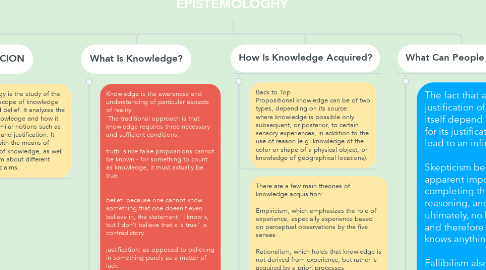EPISTEMOLOGHY
by Yusting Ladino

1. INTRODUCCION
1.1. Epistemology is the study of the nature and scope of knowledge and justified belief. It analyzes the nature of knowledge and how it relates to similar notions such as truth, belief and justification. It also deals with the means of production of knowledge, as well as skepticism about different knowledge claims.
2. How Is Knowledge Acquired?
2.1. Back to Top Propositional knowledge can be of two types, depending on its source: where knowledge is possible only subsequent, or posterior, to certain sensory experiences, in addition to the use of reason (e.g. knowledge of the color or shape of a physical object, or knowledge of geographical locations).
2.2. There are a few main theories of knowledge acquisition: Empiricism, which emphasizes the role of experience, especially experience based on perceptual observations by the five senses Rationalism, which holds that knowledge is not derived from experience, but rather is acquired by a priori processes Representationalism holds that the world we see in conscious experience is not the real world itself, but merely a miniature virtual-reality replica of that world Constructivism presupposes that all knowledge is "constructed", in that it is contingent on convention, human perception and social experience.
3. What Is Knowledge?
3.1. Knowledge is the awareness and understanding of particular aspects of reality The traditional approach is that knowledge requires three necessary and sufficient conditions. truth: since false propositions cannot be known - for something to count as knowledge, it must actually be true. belief: because one cannot know something that one doesn't even believe in, the statement "I know x, but I don't believe that x is true" is contradictory. justification: as opposed to believing in something purely as a matter of luck. The most contentious part of all this is the definition of justification, and there are several schools of thought on the subject
4. What Can People Know?
4.1. The fact that any given justification of knowledge will itself depend on another belief for its justification appears to lead to an infinite regress. Skepticism begins with the apparent impossibility of completing this infinite chain of reasoning, and argues that, ultimately, no beliefs are justified and therefore no one really knows anything. Fallibilism also claims that absolute certainty about knowledge is impossible, or at least that all claims to knowledge could, in principle, be mistaken.
4.2. In response to this regress problem, various schools of thought have arisen: Foundationalism claims that some beliefs that support other beliefs are foundational and do not themselves require justification by other beliefs (self-justifying or infallible beliefs or those based on perception or certain a priori considerations). Instrumentalism is the methodological view that concepts and theories are merely useful instruments, Instrumentalism therefore denies that theories are truth-evaluable. Pragmatism is a similar concept, which holds that something is true only insofar as it works and has practical consequences.
4.3. Infinitism typically takes the infinite series to be merely potential, and an individual need only have the ability to bring forth the relevant reasons when the need arises. Coherentism holds that an individual belief is justified circularly by the way it fits together (coheres) with the rest of the belief system of which it is a part, so that the regress does not proceed according to a pattern of linear justification. Foundherentism is another position which is meant to be a unification of foundationalism and coherentism.


